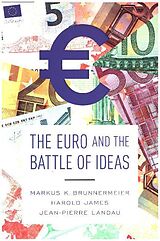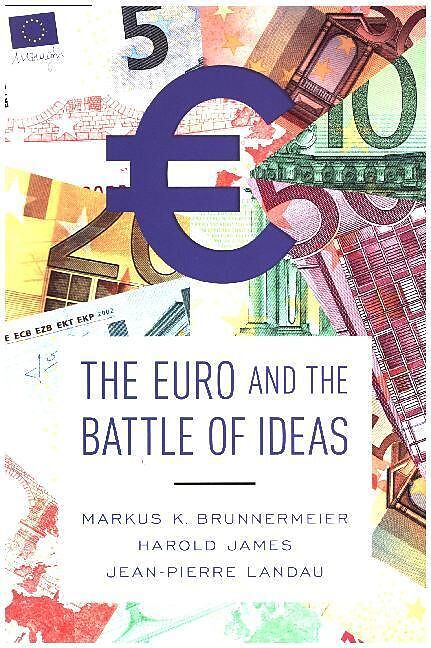The Euro and the Battle of Ideas
Einband:
Fester Einband
EAN:
9780691172927
Untertitel:
Englisch
Genre:
Allgemeines & Lexika
Autor:
Markus K. Brunnermeier, Harold James, Jean-Pierre Landau
Herausgeber:
University Presses
Anzahl Seiten:
448
Erscheinungsdatum:
13.09.2016
ISBN:
978-0-691-17292-7
Zusatztext "A very comprehensive and very well written overview of the Euro crisis." ---Ivo Maes, History of Economic Ideas Informationen zum Autor Markus K. Brunnermeier is the Edwards S. Sanford Professor of Economics at Princeton University and Director of Princeton's Bendheim Center of Finance. Harold James is professor of history and international affairs and the Claude and Lore Kelly Professor of European Studies at Princeton University. Jean-Pierre Landau is former deputy governor of the Banque de France and associate professor of economics at Sciences Po in Paris. Klappentext Why is Europe's great monetary endeavor, the Euro, in trouble? A string of economic difficulties in Greece, Ireland, Spain, Italy, and other Eurozone nations has left observers wondering whether the currency union can survive. In this book, Markus Brunnermeier, Harold James, and Jean-Pierre Landau argue that the core problem with the Euro lies in the philosophical differences between the founding countries of the Eurozone, particularly Germany and France. But the authors also show how these seemingly incompatible differences can be reconciled to ensure Europe's survival. As the authors demonstrate, Germany, a federal state with strong regional governments, saw the Maastricht Treaty, the framework for the Euro, as a set of rules. France, on the other hand, with a more centralized system of government, saw the framework as flexible, to be overseen by governments. The authors discuss how the troubles faced by the Euro have led its member states to focus on national, as opposed to collective, responses, a reaction explained by the resurgence of the battle of economic ideas: rules vs. discretion, liability vs. solidarity, solvency vs. liquidity, austerity vs. stimulus. Zusammenfassung How philosophical differences between Eurozone nations led to the Euro crisisand where to go from here Why is Europe's great monetary endeavor, the Euro, in trouble? A string of economic difficulties in Greece, Ireland, Spain, Italy, and other Eurozone nations has left observers wondering whether the currency union can survive. In this book, Markus Brunnermeier, Harold James, and Jean-Pierre Landau argue that the core problem with the Euro lies in the philosophical differences between the founding countries of the Eurozone, particularly Germany and France. But the authors also show how these seemingly incompatible differences can be reconciled to ensure Europe's survival. As the authors demonstrate, Germany, a federal state with strong regional governments, saw the Maastricht Treaty, the framework for the Euro, as a set of rules. France, on the other hand, with a more centralized system of government, saw the framework as flexible, to be overseen by governments. The authors discuss how the troubles faced by the Euro have led its member states to focus on national, as opposed to collective, responses, a reaction explained by the resurgence of the battle of economic ideas: rules vs. discretion, liability vs. solidarity, solvency vs. liquidity, austerity vs. stimulus. Weaving together economic analysis and historical reflection, The Euro and the Battle of Ideas provides a forensic investigation and a road map for Europe's future. ...
"A very comprehensive and very well written overview of the Euro crisis."---Ivo Maes, History of Economic Ideas
Autorentext
Markus K. Brunnermeier, Harold James & Jean-Pierre Landau
Klappentext
Why is Europe's great monetary endeavor, the Euro, in trouble? A string of economic difficulties in Greece, Ireland, Spain, Italy, and other Eurozone nations has left observers wondering whether the currency union can survive. In this book, Markus Brunnermeier, Harold James, and Jean-Pierre Landau argue that the core problem with the Euro lies in the philosophical differences between the founding countries of the Eurozone, particularly Germany and France. But the authors also show how these seemingly incompatible differences can be reconciled to ensure Europe's survival. As the authors demonstrate, Germany, a federal state with strong regional governments, saw the Maastricht Treaty, the framework for the Euro, as a set of rules. France, on the other hand, with a more centralized system of government, saw the framework as flexible, to be overseen by governments. The authors discuss how the troubles faced by the Euro have led its member states to focus on national, as opposed to collective, responses, a reaction explained by the resurgence of the battle of economic ideas: rules vs. discretion, liability vs. solidarity, solvency vs. liquidity, austerity vs. stimulus.

Leider konnten wir für diesen Artikel keine Preise ermitteln ...
billigbuch.ch sucht jetzt für Sie die besten Angebote ...
Die aktuellen Verkaufspreise von 6 Onlineshops werden in Realtime abgefragt.
Sie können das gewünschte Produkt anschliessend direkt beim Anbieter Ihrer Wahl bestellen.
Loading...
Die aktuellen Verkaufspreise von 6 Onlineshops werden in Realtime abgefragt.
Sie können das gewünschte Produkt anschliessend direkt beim Anbieter Ihrer Wahl bestellen.
| # | Onlineshop | Preis CHF | Versand CHF | Total CHF | ||
|---|---|---|---|---|---|---|
| 1 | Seller | 0.00 | 0.00 | 0.00 |
